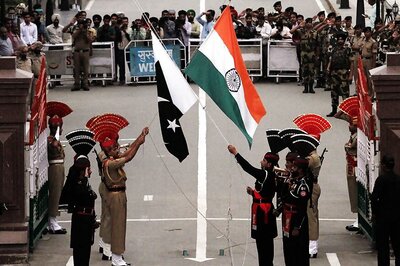
views
Jammu and Kashmir Lok Sabha Election Results 2019: National Conference (NC), headed by Farooq Abdullah, has bagged all the three parliamentary constituencies in the Kashmir valley. Earlier, all the three seats were held by People's Democratic Party (PDP) headed by the former chief minister of the state Mehbooba Mufti. This electoral rout for the PDP comes in the wake of rise in violence in the valley and a backlash from the voters after PDP aligned with the Bharatiya Janata Party (BJP) in 2015 to form the state government. The move to form the government with the BJP had not gone well with the people in the valley.
In Jammu province, however, BJP has continued to maintain its grip and bagged both the parliamentary constituencies -- Jammu and Udhampur.
In Ladakh, too, BJP has been able to trounce Sajjad Kargili, an independent candidate, who was in a direct contest with the saffron party candidate. Kargili is being supported by both PDP and NC.
The state of Jammu and Kashmir sends just six members to Parliament. Yet, the Kashmir situation dominated the national discourse during the Lok Sabha election 2019, setting the agenda for various political parties including the Bharatiya Janata Party (BJP) and the Congress. The state that went to polls in five phases from April 11 to May 5 is currently under the President’s rule after the Election Commission postponed the state Assembly election citing security concerns.
Earlier, most of the exit polls had predicted that of the six Lok Sabha seats in Jammu and Kashmir, the BJP was to win two seats in Jammu, the Congress one in Ladakh and the National Conference (NC) all the three seats of the Valley. Most exit polls had also predicted that the PDP could be heading for a rout in the state.
Follow all the live updates of Lok Sabha Election results here:
Here are the top ten developments from the state:
Farooq Abdullah's win from Srinagar this time comes at the time when controversy over the special constitutional position of Jammu and Kashmir has become the central issue in this election, after the BJP announced that it would scrap Articles 370 and 35A. In Srinagar constituency, elections were low key this time mainly because Abdullah was contesting from here with no strong candidate in opposition and the killings in the by-polls of 2017 still weigh heavy on the electorate, resulting in a mere 14 % voter turnout.
The constituency of Srinagar in itself has a history of poor turnouts—with just 25.55% in 2009 and 25.86% in 2014. The constituency had witnessed a voter turnout of 11.93 per cent in 1999, the fifth lowest poll percentage in the country’s electoral history.
With BJP winning both the Jammu seats, it looks like the strategy to consolidate the secular vote hasn’t worked in the region. To counter the BJP, NC and PDP had supported Congress in Jammu.
In Jammu province, the sitting MP Jitendra Singh of the BJP was in a direct fight against Congress’ Vikramaditya Singh in the Udhampur, a Lok Sabha seat which was earlier held by Ghulam Nabi Azad of the Congress. The other parliamentary constituency in the region is Jammu where the sitting BJP MP Jugal Kishore Sharma of BJP won against Raman Bhalla of Congress.
An interesting twist in the Jammu elections was added by Lal Singh, a BJP leader and a minister in the last PDP-BJP government. Singh resigned after he and another minister stirred controversy by addressing a rally in support of the Kathua rape suspects.
This was the also first general election that was held in what has come to be known as the post-Burhan Wani phase, which also delayed the by polls for the south Kashmir constituency. The Pulwama terror attack that took place two months before polling on February 14 further worsened the situation in the valley.
On the three seats of the Valley, elections were held in five phases. The Anantnag constituency, which consists of four south Kashmir districts—Kulgam, Pulwama, Shopian and Anantnag—voted in three phases, a first in the electoral history of the country owing to security concerns.




















Comments
0 comment